The importance of teaching pronunciation
The importance of teaching pronunciation


#1 слайд
Ali Nurgul Zheteskyzy The importance of teaching
pronunciation.
1 слайд
Ali Nurgul Zheteskyzy The importance of teaching pronunciation.

#2 слайд
First impressions
Pronunciation is definitely the biggest thing that people notice when
you are speaking English. You can live without advanced
vocabulary, you can use simple words to say what you want to say.
You can use ‘simple’grammar.But there is no such thing as
"simple pronunciation ». If the pronunciation is poor , neither
Grammar nor vocabulary would help you !
Here is an anecdote about this:
After coming back from a vacation in the USA, a friend of mine
said:"Whenever I spoke to a person in America, they kept asking
me What? What? I would repeat my sentence again and again.
Finally they would say Ah-ha! and then say my sentence, using
exactly my words! It was very humiliating. I knew my words
and grammar were good, but nobody would understand me, just
because of my Pronunciation.
2 слайд
First impressions Pronunciation is definitely the biggest thing that people notice when you are speaking English. You can live without advanced vocabulary, you can use simple words to say what you want to say. You can use ‘simple’grammar.But there is no such thing as "simple pronunciation ». If the pronunciation is poor , neither Grammar nor vocabulary would help you ! Here is an anecdote about this: After coming back from a vacation in the USA, a friend of mine said:"Whenever I spoke to a person in America, they kept asking me What? What? I would repeat my sentence again and again. Finally they would say Ah-ha! and then say my sentence, using exactly my words! It was very humiliating. I knew my words and grammar were good, but nobody would understand me, just because of my Pronunciation.

#3 слайд
Content
Learners Tasks
GoalsWhat to take into account when....
3 слайд
Content Learners Tasks GoalsWhat to take into account when....

#4 слайд
Should pronunciation be
taught and acquired
early? Or is it something
we can worry about later?WHEN TO ACQUIRE ?
4 слайд
Should pronunciation be taught and acquired early? Or is it something we can worry about later?WHEN TO ACQUIRE ?

#5 слайд
In the absence of a good model and
without guidance, the learner will
perceive, produce and internalize
sounds of the target language based
on the native language sounds.
For this reason, if not given emphasis
at the very beginning, pronunciation
will never be acquired well.
5 слайд
In the absence of a good model and without guidance, the learner will perceive, produce and internalize sounds of the target language based on the native language sounds. For this reason, if not given emphasis at the very beginning, pronunciation will never be acquired well.

#6 слайд
When accuracy is neglected, the
result will be fossilized
pronunciation errors.Since pronunciation habits are
formed early, it seems obvious that
it is at that point that the
development of a good
pronunciation should be
emphasized.
6 слайд
When accuracy is neglected, the result will be fossilized pronunciation errors.Since pronunciation habits are formed early, it seems obvious that it is at that point that the development of a good pronunciation should be emphasized.

#7 слайд
HOW TO ACQUIRE?
• Naturally : as a result of exposure and
interaction in the environment of the target
language and its culture.
•
By teaching : providing a good
pronunciation model (instructors with native-like
pronunciation, recordings, etc.), explaining
differences , using phonetic symbols to make
pronunciation visible , limited peer interaction,
effective error correction, exercising accurate
pronunciation.
7 слайд
HOW TO ACQUIRE? • Naturally : as a result of exposure and interaction in the environment of the target language and its culture. • By teaching : providing a good pronunciation model (instructors with native-like pronunciation, recordings, etc.), explaining differences , using phonetic symbols to make pronunciation visible , limited peer interaction, effective error correction, exercising accurate pronunciation.

#8 слайд
SPELLING INTERFERENCE
The written language is a significant
source of input to EFL students.
The higher the spelling inconsistency
is, the more negative the influence
on pronunciation will be. The English
spelling does not serve as a guide
to pronunciation. On the contrary, it
can often be misleading. For
instance:
8 слайд
SPELLING INTERFERENCE The written language is a significant source of input to EFL students. The higher the spelling inconsistency is, the more negative the influence on pronunciation will be. The English spelling does not serve as a guide to pronunciation. On the contrary, it can often be misleading. For instance:
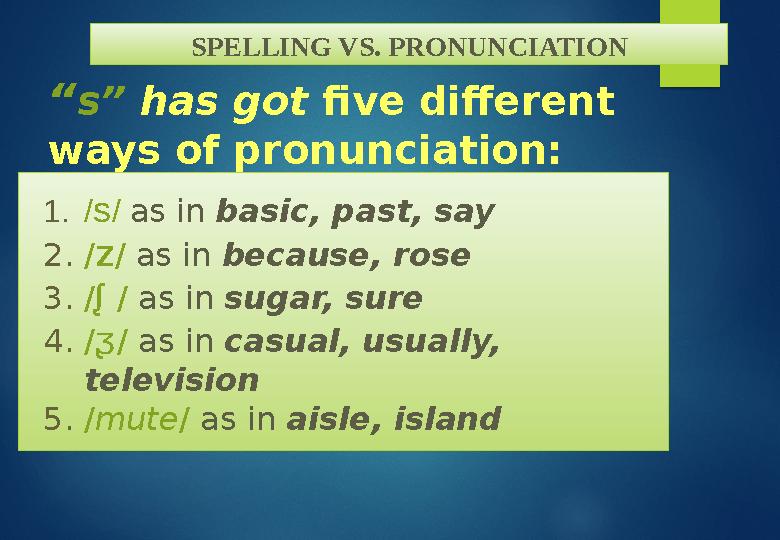
#9 слайд
SPELLING VS. PRONUNCIATION
“ s” has got five different
ways of pronunciation:
1. / s / as in basic, past, say
2. / z / as in because, rose
3. / ᶘ / as in sugar, sure
4. / ᶚ / as in casual, usually,
television
5. / mut e / as in aisle, island
9 слайд
SPELLING VS. PRONUNCIATION “ s” has got five different ways of pronunciation: 1. / s / as in basic, past, say 2. / z / as in because, rose 3. / ᶘ / as in sugar, sure 4. / ᶚ / as in casual, usually, television 5. / mut e / as in aisle, island

#10 слайд
The frustration of the EFL learner
never ends:
1. bough / baʊ /
2. cough / kɒf /
3. dough / dəʊ /
4. rough / rʌf /
5. through / θ ruː /
6. hiccough / ˈ hɪkʌp /
10 слайд
The frustration of the EFL learner never ends: 1. bough / baʊ / 2. cough / kɒf / 3. dough / dəʊ / 4. rough / rʌf / 5. through / θ ruː / 6. hiccough / ˈ hɪkʌp /

#11 слайд
“ Comfortable” Intelligibility•
Convey message
•
“ Positive face”
•
Expectations on the listener •
Understand message
•
Tolerance
•
Expectations on the speakerForeign Speaker Native listener
‘ threshold level’ acceptability accessibilityinteractio
n
11 слайд
“ Comfortable” Intelligibility• Convey message • “ Positive face” • Expectations on the listener • Understand message • Tolerance • Expectations on the speakerForeign Speaker Native listener ‘ threshold level’ acceptability accessibilityinteractio n
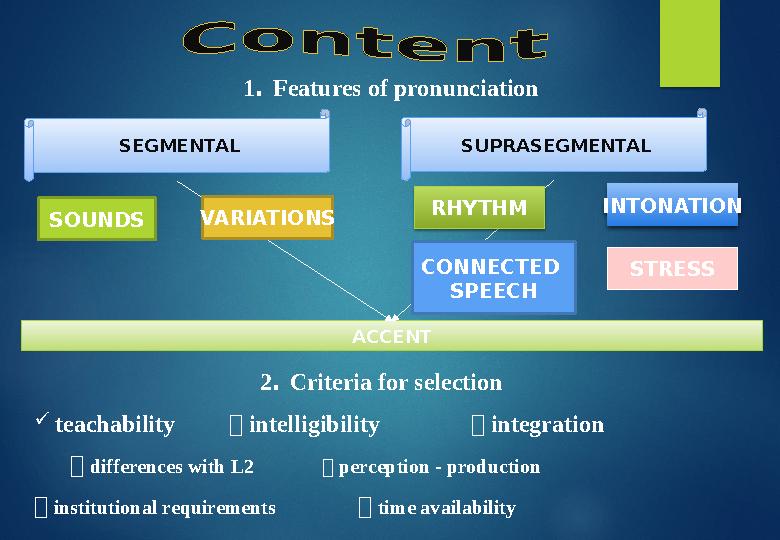
#12 слайд
ACCENTSEGMENTAL SUPRASEGMENTAL1 . Features of pronunciation
SOUNDS
STRESSINTONATION
2 . Criteria for selection
teachability intelligibility integration
differences with L2 perception - production
institutional requirements time availabilityVARIATIONS
CONNECTED
SPEECHRHYTHM
12 слайд
ACCENTSEGMENTAL SUPRASEGMENTAL1 . Features of pronunciation SOUNDS STRESSINTONATION 2 . Criteria for selection teachability intelligibility integration differences with L2 perception - production institutional requirements time availabilityVARIATIONS CONNECTED SPEECHRHYTHM
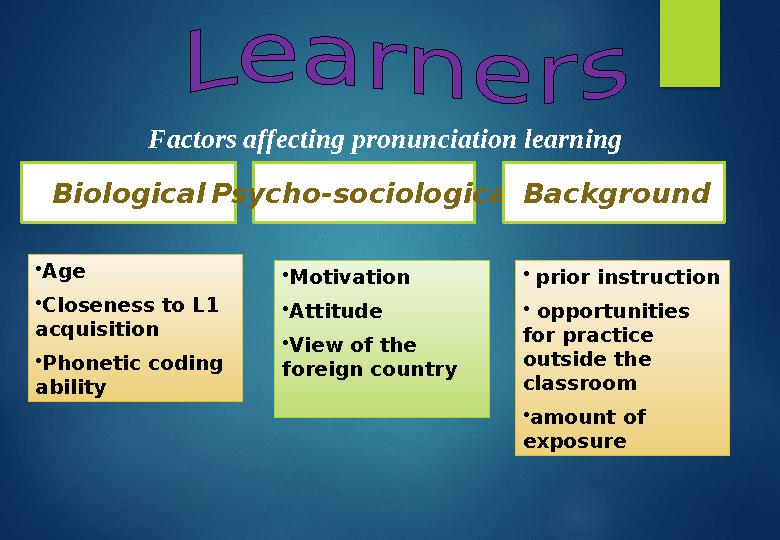
#13 слайд
Biological Factors affecting pronunciation learning
Psycho-sociological Background
•
Age
•
Closeness to L1
acquisition
•
Phonetic coding
ability •
Motivation
•
Attitude
•
View of the
foreign country •
prior instruction
•
opportunities
for practice
outside the
classroom
•
amount of
exposure
13 слайд
Biological Factors affecting pronunciation learning Psycho-sociological Background • Age • Closeness to L1 acquisition • Phonetic coding ability • Motivation • Attitude • View of the foreign country • prior instruction • opportunities for practice outside the classroom • amount of exposure
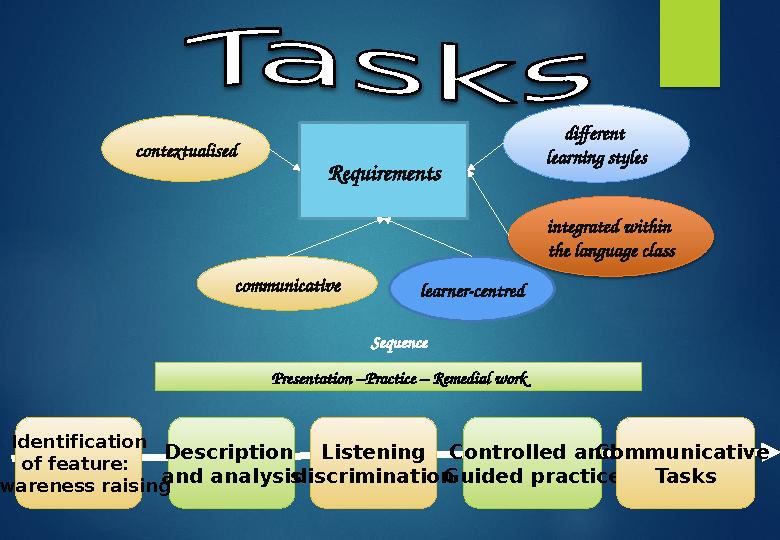
#14 слайд
contextualised
integrated within
the language classRequirements different
learning styles
communicative
learner-centred
Sequence
Presentation –Practice – Remedial work
Description
and analysis Listening
discrimination Controlled and
Guided practice Communicative
TasksIdentification
of feature:
awareness raising
14 слайд
contextualised integrated within the language classRequirements different learning styles communicative learner-centred Sequence Presentation –Practice – Remedial work Description and analysis Listening discrimination Controlled and Guided practice Communicative TasksIdentification of feature: awareness raising
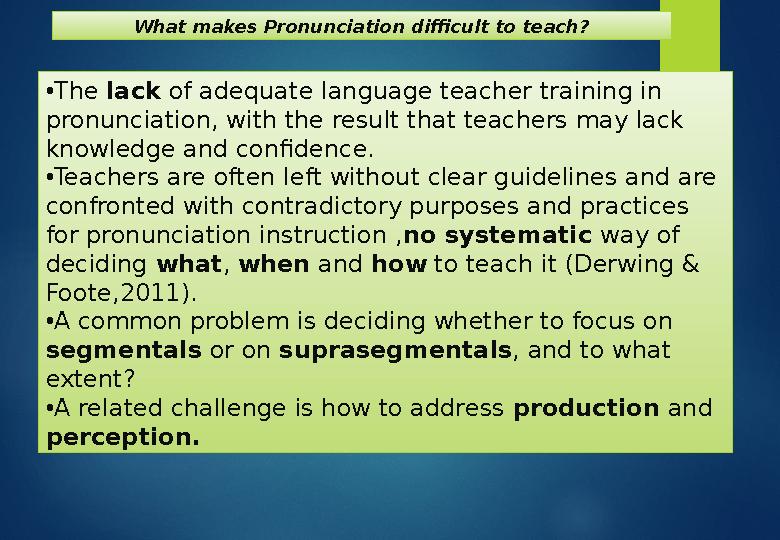
#15 слайд
What makes Pronunciation difficult to teach?
•
The lack of adequate language teacher training in
pronunciation, with the result that teachers may lack
knowledge and confidence.
•
Teachers are often left without clear guidelines and are
confronted with contradictory purposes and practices
for pronunciation instruction , no systematic way of
deciding what , when and how to teach it (Derwing &
Foote,2011).
•
A common problem is deciding whether to focus on
segmentals or on suprasegmentals , and to what
extent?
•
A related challenge is how to address production and
perception.
15 слайд
What makes Pronunciation difficult to teach? • The lack of adequate language teacher training in pronunciation, with the result that teachers may lack knowledge and confidence. • Teachers are often left without clear guidelines and are confronted with contradictory purposes and practices for pronunciation instruction , no systematic way of deciding what , when and how to teach it (Derwing & Foote,2011). • A common problem is deciding whether to focus on segmentals or on suprasegmentals , and to what extent? • A related challenge is how to address production and perception.
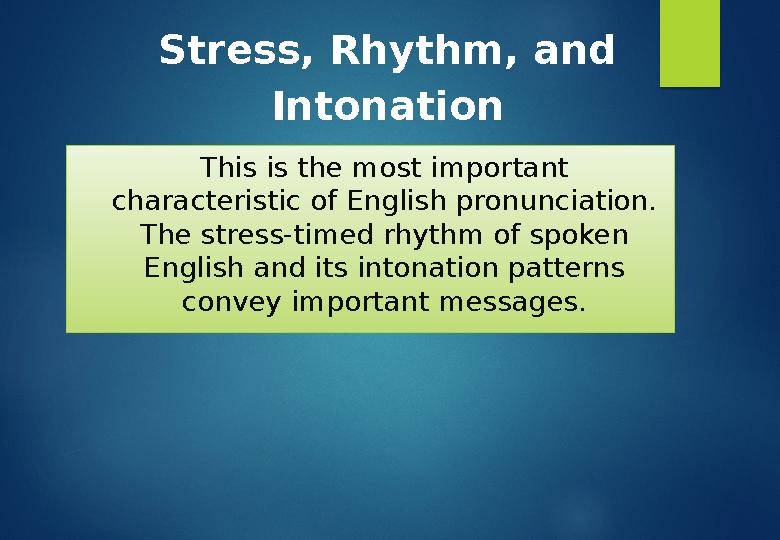
#16 слайд
Stress, Rhythm, and
Intonation
This is the most important
characteristic of English pronunciation.
The stress-timed rhythm of spoken
English and its intonation patterns
convey important messages.
16 слайд
Stress, Rhythm, and Intonation This is the most important characteristic of English pronunciation. The stress-timed rhythm of spoken English and its intonation patterns convey important messages.
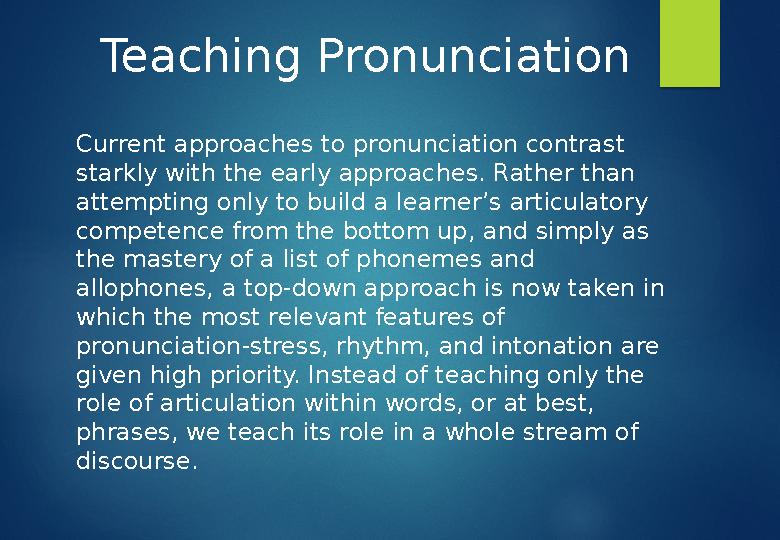
#17 слайд
Teaching Pronunciation
Current approaches to pronunciation contrast
starkly with the early approaches. Rather than
attempting only to build a learner’s articulatory
competence from the bottom up, and simply as
the mastery of a list of phonemes and
allophones, a top-down approach is now taken in
which the most relevant features of
pronunciation-stress, rhythm, and intonation are
given high priority. Instead of teaching only the
role of articulation within words, or at best,
phrases, we teach its role in a whole stream of
discourse.
17 слайд
Teaching Pronunciation Current approaches to pronunciation contrast starkly with the early approaches. Rather than attempting only to build a learner’s articulatory competence from the bottom up, and simply as the mastery of a list of phonemes and allophones, a top-down approach is now taken in which the most relevant features of pronunciation-stress, rhythm, and intonation are given high priority. Instead of teaching only the role of articulation within words, or at best, phrases, we teach its role in a whole stream of discourse.
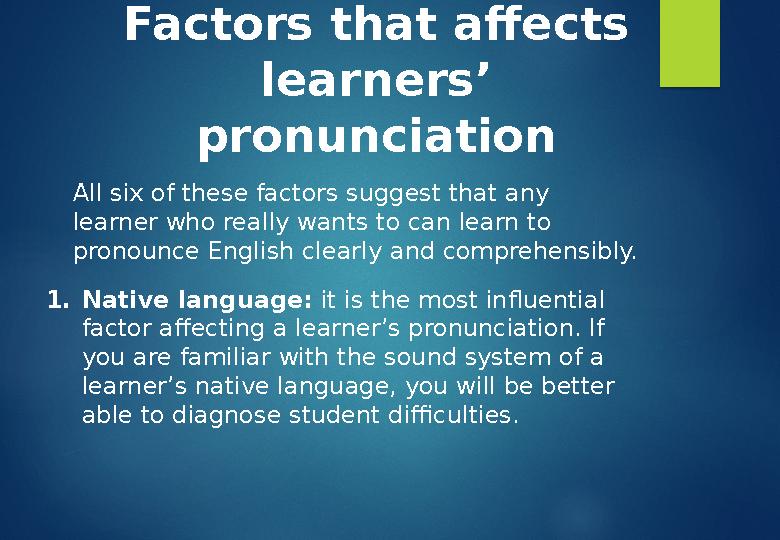
#18 слайд
Factors that affects
learners’
pronunciation
All six of these factors suggest that any
learner who really wants to can learn to
pronounce English clearly and comprehensibly.
1. Native language: it is the most influential
factor affecting a learner’s pronunciation. If
you are familiar with the sound system of a
learner’s native language, you will be better
able to diagnose student difficulties.
18 слайд
Factors that affects learners’ pronunciation All six of these factors suggest that any learner who really wants to can learn to pronounce English clearly and comprehensibly. 1. Native language: it is the most influential factor affecting a learner’s pronunciation. If you are familiar with the sound system of a learner’s native language, you will be better able to diagnose student difficulties.
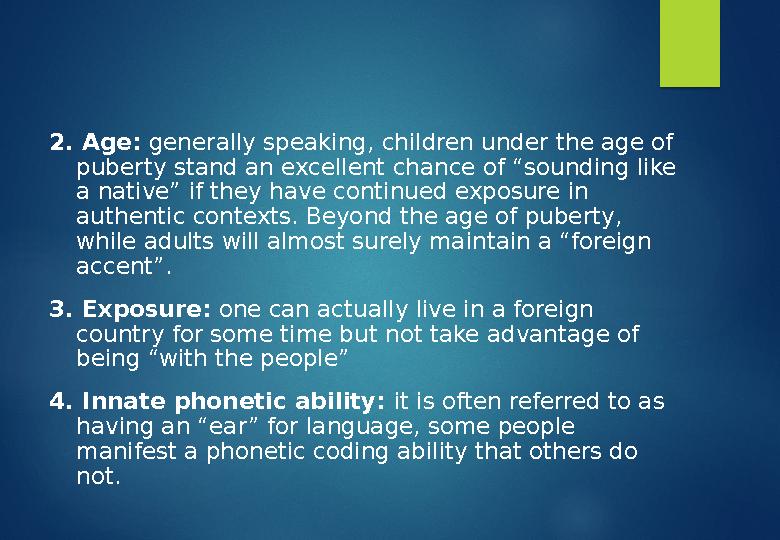
#19 слайд
2. Age: generally speaking, children under the age of
puberty stand an excellent chance of “sounding like
a native” if they have continued exposure in
authentic contexts. Beyond the age of puberty,
while adults will almost surely maintain a “foreign
accent”.
3. Exposure: one can actually live in a foreign
country for some time but not take advantage of
being “with the people”
4. Innate phonetic ability: it is often referred to as
having an “ear” for language, some people
manifest a phonetic coding ability that others do
not.
19 слайд
2. Age: generally speaking, children under the age of puberty stand an excellent chance of “sounding like a native” if they have continued exposure in authentic contexts. Beyond the age of puberty, while adults will almost surely maintain a “foreign accent”. 3. Exposure: one can actually live in a foreign country for some time but not take advantage of being “with the people” 4. Innate phonetic ability: it is often referred to as having an “ear” for language, some people manifest a phonetic coding ability that others do not.
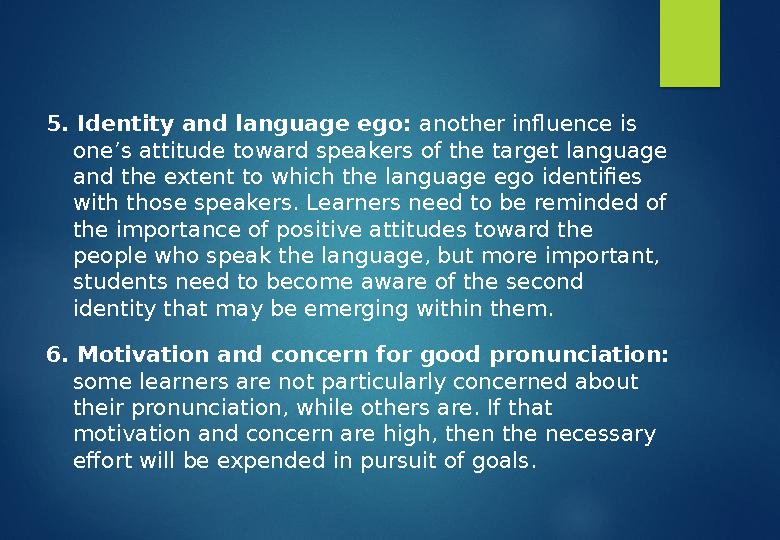
#20 слайд
5. Identity and language ego: another influence is
one’s attitude toward speakers of the target language
and the extent to which the language ego identifies
with those speakers. Learners need to be reminded of
the importance of positive attitudes toward the
people who speak the language, but more important,
students need to become aware of the second
identity that may be emerging within them.
6. Motivation and concern for good pronunciation:
some learners are not particularly concerned about
their pronunciation, while others are. If that
motivation and concern are high, then the necessary
effort will be expended in pursuit of goals.
20 слайд
5. Identity and language ego: another influence is one’s attitude toward speakers of the target language and the extent to which the language ego identifies with those speakers. Learners need to be reminded of the importance of positive attitudes toward the people who speak the language, but more important, students need to become aware of the second identity that may be emerging within them. 6. Motivation and concern for good pronunciation: some learners are not particularly concerned about their pronunciation, while others are. If that motivation and concern are high, then the necessary effort will be expended in pursuit of goals.
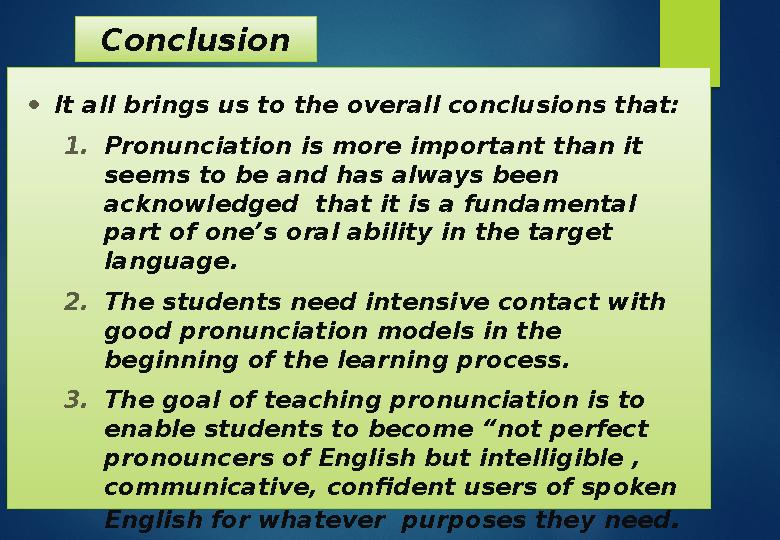
#21 слайд
Conclusion
• It all brings us to the overall conclusions that:
1. Pronunciation is more important than it
seems to be and has always been
acknowledged that it is a fundamental
part of one’s oral ability in the target
language.
2. The students need intensive contact with
good pronunciation models in the
beginning of the learning process.
3. The goal of teaching pronunciation is to
enable students to become “not perfect
pronouncers of English but intelligible ,
communicative, confident users of spoken
English for whatever purposes they need .
21 слайд
Conclusion • It all brings us to the overall conclusions that: 1. Pronunciation is more important than it seems to be and has always been acknowledged that it is a fundamental part of one’s oral ability in the target language. 2. The students need intensive contact with good pronunciation models in the beginning of the learning process. 3. The goal of teaching pronunciation is to enable students to become “not perfect pronouncers of English but intelligible , communicative, confident users of spoken English for whatever purposes they need .

#22 слайд
Thank you for
your attention !
22 слайд
Thank you for your attention !

шағым қалдыра аласыз
















